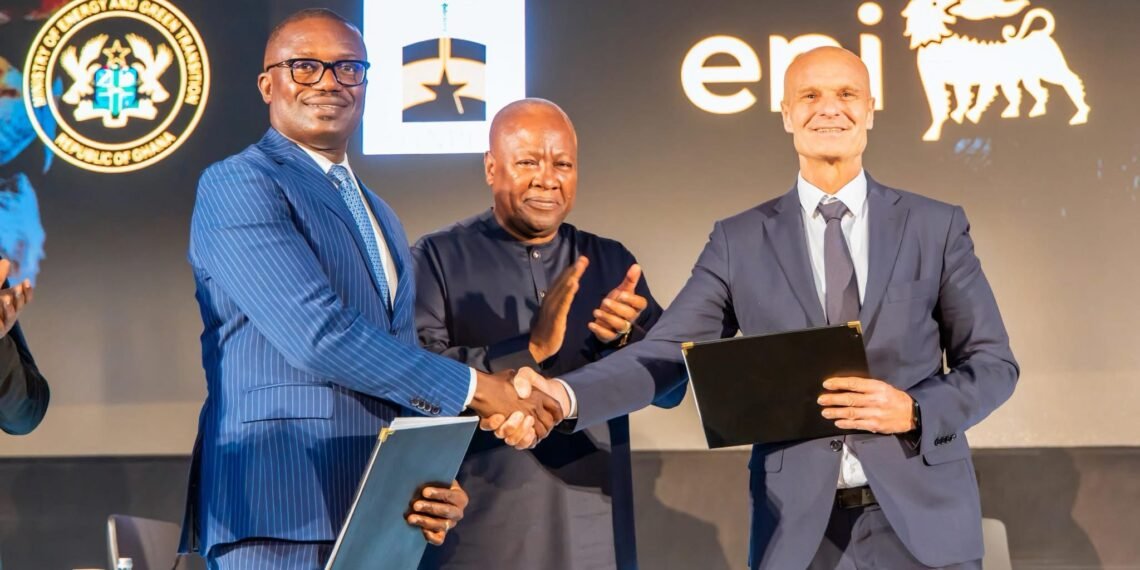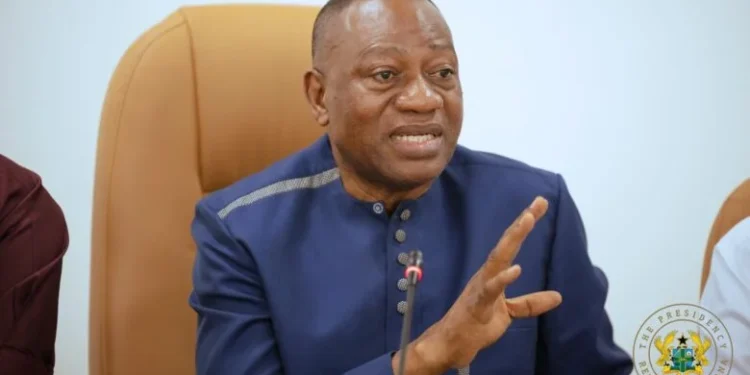Eni and its Offshore Cape Three Points (OCTP) partners, Vitol and the Ghana National Petroleum Corporation (GNPC), have signed a landmark Memorandum of Intent with the Government of Ghana to expand oil and gas production while advancing sustainable energy initiatives.
The agreement was formalised during a signing ceremony at the Kempinski Hotel in Accra, held in the presence of President John Dramani Mahama at the ongoing Africa Oil Week 2025.
The new partnership underscores Ghana’s determination to reinforce its energy security at a time of growing domestic demand and shifting global energy dynamics.
Speaking at the ceremony, Energy and Green Transition Minister John Abdulai Jinapor emphasised that Africa must shape its own energy destiny.

“The future of African energy will not be a product of luck or imitation.
“We will create it ourselves, through the decisive application of our collective human intelligence.”
John Abdulai Jinapor, Energy and Green Transition Minister
Under the agreement, the Ministries of Energy and Finance will work closely with Eni and its OCTP partners to design a comprehensive integrated investment plan.
This plan is expected to guarantee reliable, affordable, and environmentally responsible energy access for Ghanaians.
Expanding Production Capacity

A central component of the memorandum is the proposed expansion of production at the OCTP project.
By leveraging synergies between offshore and onshore infrastructure upgrades, the partnership aims to boost oil and gas output and reduce Ghana’s reliance on costly imported fuels.
The OCTP project, which has been in operation since 2018, has already supplied about 70 percent of Ghana’s gas demand for power generation.
Officials say the additional investment will not only meet rising domestic consumption but also strengthen Ghana’s position as a hub for regional energy trade.
The collaboration also sets the stage for the potential development of the Eban-Akoma field, located in Cape Three Points Block 4. The field was declared commercial in July 2025, marking it as a promising new source of hydrocarbons.
Industry observers say that tapping into Eban-Akoma will be accelerated by existing OCTP infrastructure, cutting down the time required to bring new production to market.
This approach, the partners note, will maximize value and ensure efficient development of Ghana’s natural resources.
While energy production remains at the core of the agreement, the partners stressed their continuing commitment to community development and social impact programs.
Eni and its OCTP partners have already invested more than $10 million in education, clean water, healthcare, hygiene, and local economic initiatives, directly impacting over 10,000 people across Ghana.
A second phase of investment will target micro, small, and medium-sized enterprises (MSMEs), expanding economic opportunities and strengthening local participation in Ghana’s energy economy.
Call for Partnership and Innovation

Minister Jinapor also used the occasion to rally African stakeholders to embrace partnerships grounded in transparency, mutual benefit, and technology transfer.
“I therefore challenge us all to leave this conference with more than just promises and business cards.
“Let us go with a binding commitment to act, create, and combine our intelligence to secure an energy future that is prosperous, sustainable, and distinctly African.”
John Abdulai Jinapor, Energy and Green Transition Minister
Eni has been active in Ghana since 2009 and operates the OCTP project with a 44.4 percent stake, alongside Vitol (35.6 percent) and GNPC (20 percent).
Since first oil in 2018, the OCTP project has produced over 107 million barrels of oil and 480 billion standard cubic feet (Bscf) of gas, making it a backbone of Ghana’s energy system.
The joint venture has consistently promoted a holistic model of development, combining oil and gas production with training, economic diversification, clean energy programs, and improved access to water and sanitation in local communities.
Ghana’s Energy Future

For Ghana, the memorandum represents more than an expansion of oil and gas capacity—it signals a forward-looking approach that integrates energy security, sustainability, and inclusive growth.
President Mahama, who witnessed the signing, described the agreement as a “decisive step in Ghana’s journey to harness its resources responsibly while preparing for the global energy transition.”
With global energy markets in flux and Africa’s demand rising, Ghana’s deepening partnerships with international oil companies and local stakeholders could shape not only its domestic energy landscape but also its strategic role in the continent’s evolving petroleum and gas sector.
READ ALSO: Market Cheers as Ghana’s Treasury Auction Breaks Four-Week Drought with 15.8% Oversubscription























